Why Volos is Perfect in Autumn
The charming port city of Volos...
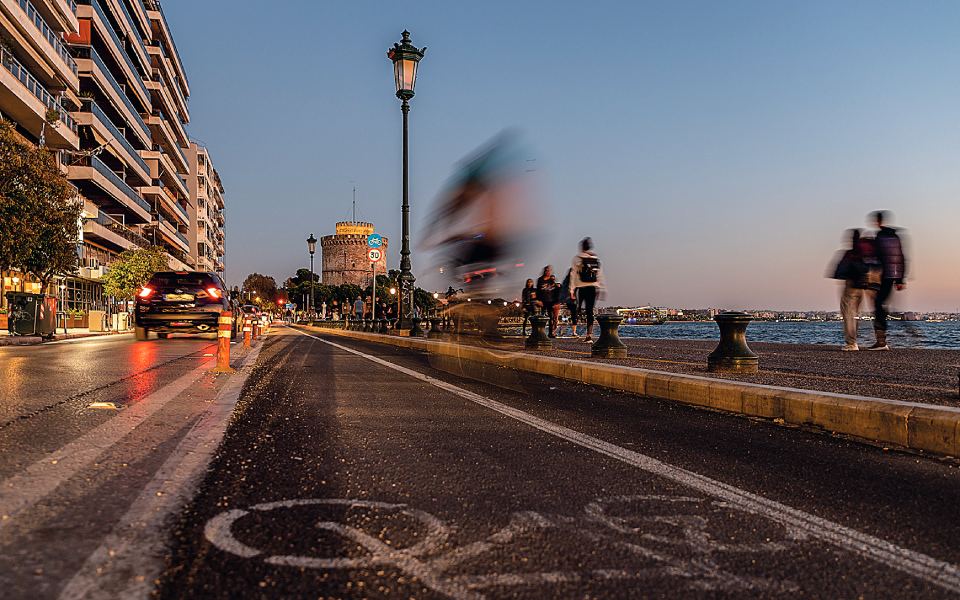
Nikis Avenue is a little narrower now, thanks to a new bike lane. The next goal is an extension of the seafront sidewalk to give more room to pedestrian traffic.
© Sakis Gioumbasis
It was a fall afternoon on Fanarioton Square, behind the White Tower.
The spot which a year ago had resembled a makeshift parking lot was now a little urban oasis, with small groups enjoying the sun on the brand new park benches. Cyclists were coming and going in the bike lane, mothers pushed their strollers along the walking path, customers lined up outside newly opened neighborhood shops and the restaurants were bursting with life.
The successful regeneration of this area last December injected commercial energy into the local landscape, creating a new hub activity in the center of Thessaloniki. It was a great example of how city life can be improved by small-scale interventions.
A few days later, a second lockdown was imposed, and the scene is now entirely different. A few people scurry by, tables are locked up inside, and only delivery bikes break the stillness. Most eateries, among them some big-name restaurants, now rely on food delivery companies to stay afloat.
A city which has outdoor living embedded in its soul finds itself shut in once again. But this, too, will pass.
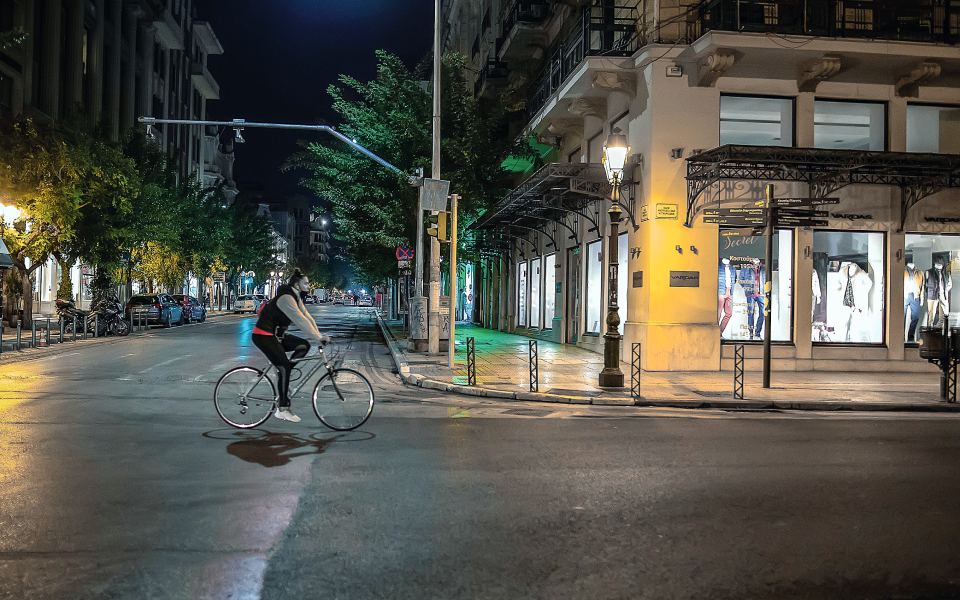
Weather permitting, city residents have more reasons than ever these days to take to their bikes to get around.
© Giannis Papanikos/INTIME News
The real question for the city, and one which has sparked a lively public conversation over the last five years since it became a city-break destination, is how it defines itself today, and where it’s headed.
“How can the most be made of 24 centuries of uninterrupted history, 33 museums, most of which are set in their ways, a famous and unconventional gastronomic scene which was the city’s lifeline during the years of recession, a talented and active research community which has attracted multinational businesses to establish digital hubs, and a privileged geographical position?” wonders Angelos N. Vassos, editorial director of the free biweekly publication Citymag, whose mid-October issue was entitled “What Kind of City Do We Want?”.
How can nearby areas of international interest, such as Mt Olympus and Vergina, be incorporated into a total tourism package to increase the length of visitors’ stays?
“When will our performances finally have English surtitles, so visitors can enjoy them?” asks Rita Sissou, an organizer of cultural events.
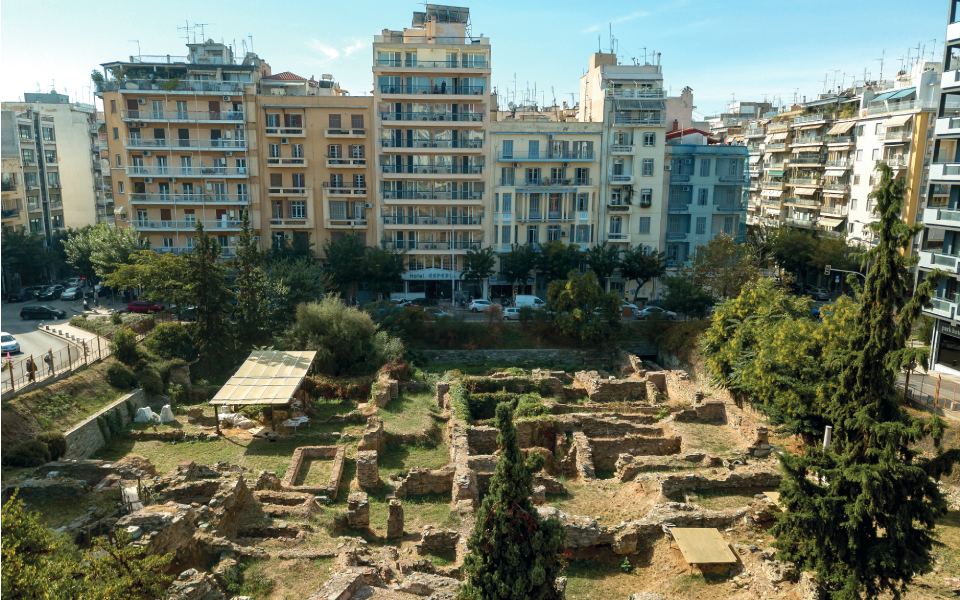
The regeneration of Government House Square is the next important planned intervention in the city landscape.
© Akia Gioumbasis
Up until September, Thessaloniki had recorded 3.5 million fewer visitor arrivals at its airport and a million fewer hotel stays compared to last year, while the cancellation of the Thessaloniki International Fair (TIF) is estimated to have deprived the city of €50 million in revenue. The “BEYOND 4.0” innovation fair, which still aims to put Thessaloniki on the global tech map, was also postponed for at least a year.
Thankfully, the city didn’t become mired in misery. For its part, TIF responded superbly and presented a fresh new product, the “Forum,” a ten-day virtual platform of panel discussions certain to enrich tech events in the future.
At the same time, the 61st International Film Festival decided on a fully digital approach, one which has gone viral on social media. For €3, you can select films from the comfort of your sofa. The experience may lack the usual festival atmosphere that holds sway in and around the Olympion Cinema, but you don’t have to feel cut off from cultural life by the pandemic.
These aren’t, of course, the city’s only institutions that have been forced to adapt; even during the first lockdown, many bars offered takeaway cocktails in compostable packaging, while several hotels let rooms at attractive prices for a more relaxed remote working location.
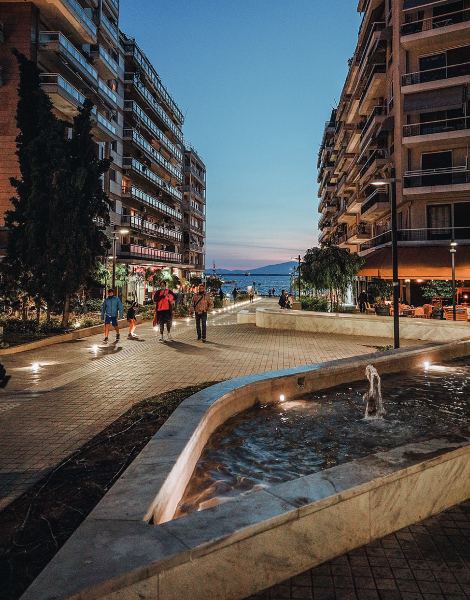
The regeneration of Fanarioton Square last December amounted to a highly successful small-scale urban intervention. |
© Olga Deikou
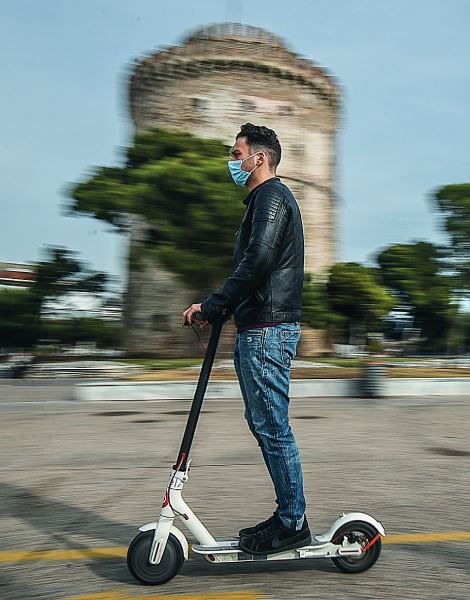
In the largely flat city of Thessaloniki, low-impact modes of transport such as scooters and bikes would be fine for everyday travel, provided proper parking facilities for such conveyances existed.
© Annis Papanikos/AP Photo
New investors adopted a philosophy that took into account the possibility of a second lockdown. One of these is Theodoros Pastourmatzis, who opened “Flavor Cartel,” an eight-table restaurant on the edge of the up-and-coming neighborhood of Ano Ladadika in September, serving creative Greek cooking at accessible prices. He kept running costs low from the start, maintained minimal stock, and invested in promoting his delivery service. During this time, when he has to stay semi-closed, he’s putting aside a large portion of his takings so the business can survive until the measures are lifted.
That is, after all, the main aim: for the city to stay standing until it can pick up where the hopeful but now seemingly so distant 2019 had left tourism, when the city’s airport was being served by 55 airlines flying to 121 destinations.
“Thessaloniki always had trouble adding more destinations, because the profitability of any new route had to be guaranteed. What worries us is that the recovery is expected to be slow,” says Andreas Mandrinos, president of the Thessaloniki Hotels Association.
According to Mandrinos, the overhaul of the city’s port (including the ferry terminal and the piers) will help increase cruise traffic and, by extension, make the city a better known destination. This would help reverse the losses of 2020, when Thessaloniki received 120,000 fewer Israeli visitors than in 2019. In other words, this emerging tourist destination lost its most firmly established market. More positive signs for the future are investments by an Israeli fund in the city’s hotel industry, and the building of the new Holocaust Museum.

From the earliest days of the pandemic, a number of food and drink businesses adapted by offering take-out and delivery options, including cocktails to go.
© Sakis Gioumbasis
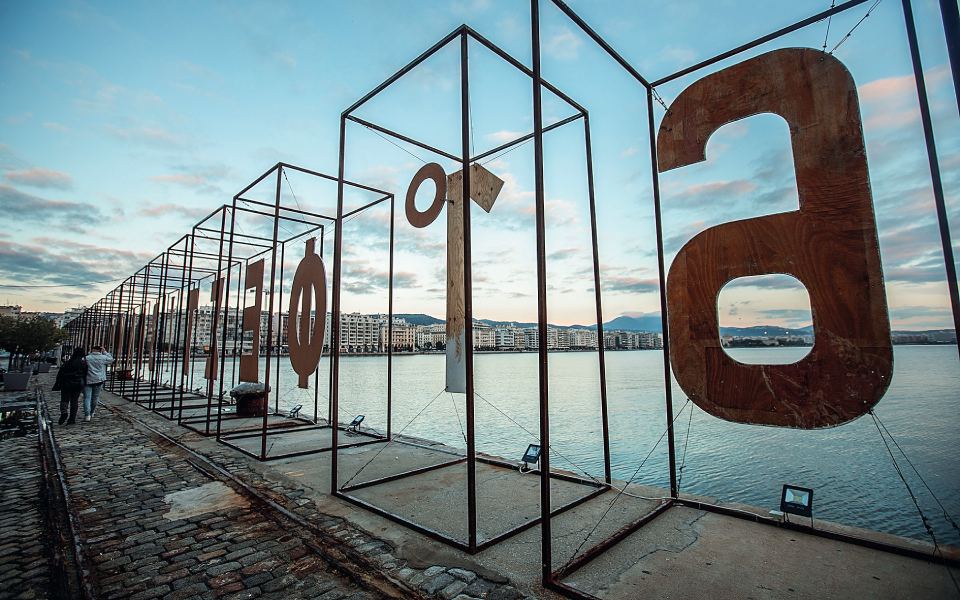
This year’s annual celebration of film will be an “at-home” affair: the 61st Thessaloniki International Film Festival is taking place online.
It isn’t just the port, of course. For over 25 years, Thessaloniki has failed to move forward with crucial infrastructure investments which could unlock the city’s growth potential and put it on the same track of development as other European cities.
A classic example would be the public transport authority (OASTH) which, having once pioneered smart technologies such as telematics, is now seen as anything but cutting-edge, with outdated buses lumbering down the streets. From the completion of the metro’s construction, which has now been put back to 2023 and which continues to clog key arteries (on Delfon Street, as soon as the roadwork barriers were removed, rental properties were snapped up) to the long-awaited flyover expected to decongest the city center, Thessaloniki has been held hostage by half-finished works, and is paying dearly for poor planning.
Another example is the old Government House Square, where an underground parking lot, in the works since 1990, has been held back by archaeological discoveries on the site. Mayor Konstantinos Zervas is hoping to deliver the square back to public use after reaching an agreement with the Ministry of Culture and the Administrative Region of Central Macedonia.
According to the agreement, the archaeological finds will be preserved and displayed on the Olympou Street end of the existing square, while a new public square, on the scale of the old one, will be laid out on Aghiou Dimitriou Street. This is a significant redesign, which will lead to the regeneration of another part of the city center, as occurred with Fanarioton Square.
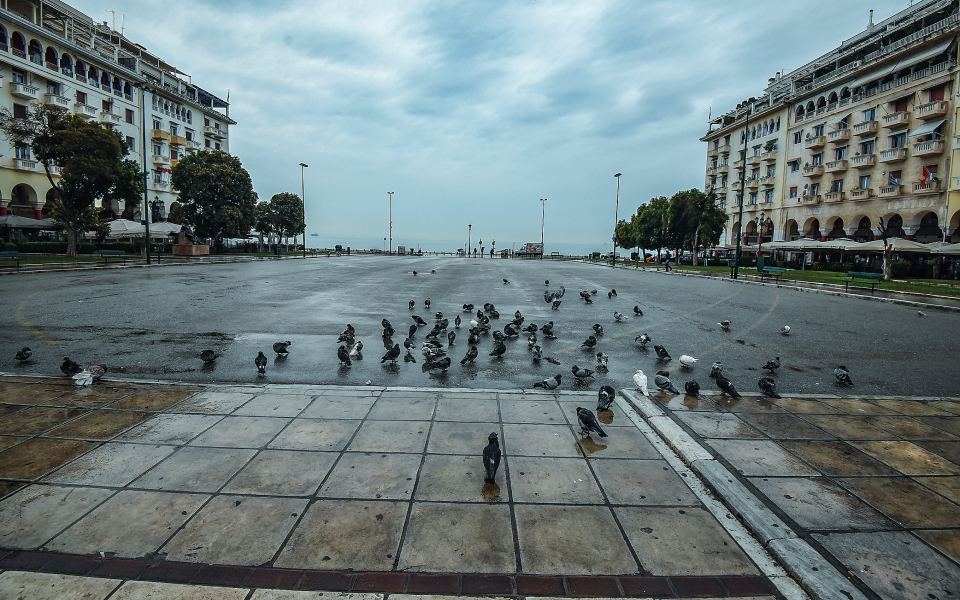
Aristotelous Square awaits the result of an international competition regarding plans for its redesign, with the smart money being on those layouts that keep its unobstructed view to the sea.
© Giannis Papanikos/INTIME News
A series of other urban improvements are planned. This coming year will see the launch of an international competition for the redesign of Aristotelous Square. The extension of the old seafront promenade along Nikis Avenue, which will feature decking, has been scheduled for the beginning of 2021. The site of a planned Memory Park on Eleftherias Square – which local shopkeepers like to say has been struck with “the metro syndrome” – has been fenced off.
Lastly, there is the project that is expected to have the biggest impact on the economic and social life of the city – the redesign of the TIF exhibition grounds, which, despite the pandemic, is moving ahead as scheduled. The winner of the international design contest for that 16-hectare project will be announced in July of 2021, and work is expected to be completed in 2026.
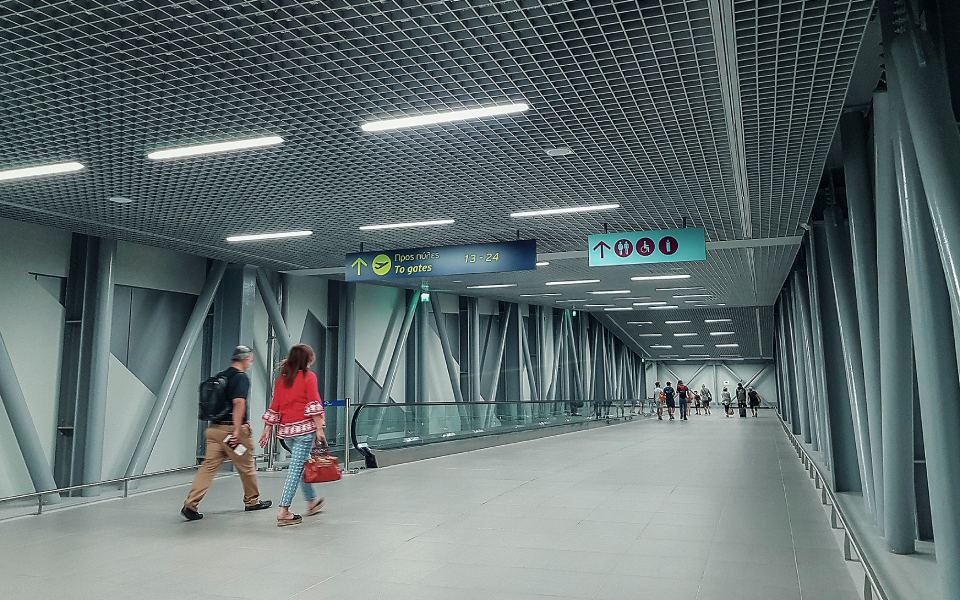
Newly renovated Thessaloniki “Makedonia” Airport offers its users a much improved travel experience.
© Sakis Gioumbasis
The year 2026 may seem far off, but it’s certainly to be hoped that by then the city will have sorted out most of its everyday problems. The eight-year tenure of Yiannis Boutaris, mayor of Thessaloniki until 2019, left behind a bittersweet taste, according to conversations I’ve had with city restaurant and hospitality entrepreneurs.
On the one hand, he personally extended Thessaloniki’s outreach, opening up new markets and breaking many stifling taboos – it was during his tenure that the city’s first Gay Pride parade was held. On the other hand, he also left behind a city without ready solutions for excess rubbish, illegal parking and sprawling café seating. As one journalist – who asked to remain anonymous “because we’re just one big village here” – confided, “It’s like inviting guests to your home but having nothing to offer them.”
Having something substantial to offer is the new mayor’s goal. He wants to improve the quality of life in the city’s neighborhoods, and to not disappoint the city’s visitors, who will soon be collecting their luggage in a newly renovated arrivals terminal at Thessaloniki “Makedonia” Airport.
“We’re moving ahead with an extensive neighborhood renewal program,“ Mayor Zervas says, “including road resurfacing, lighting and fencing repairs, and the creation of green spaces, more recycling points, and underground waste storage in some areas. Our main concern is establishing order and improving the quality of daily life. We‘ve applied to the ‘Antonis Tritsis’ local government investment program for funds of €15 million to digitize city services; everything from parking to virtual city guides.”
Imagine buying a ticket at Venizelos Metro Station while reading up on your smartphone about the 4th-century paved Byzantine road discovered below Egnatia Street. What sounds like a dream will soon be a reality.
The charming port city of Volos...
A Thessaloniki expert selects 13 spots...
Cultural leaders reflect on Thessaloniki’s layers...
Major infrastructure projects, a significant urban...